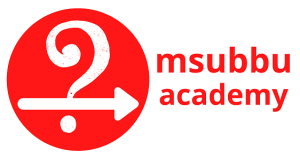Demo Class on 20-Apr-2025
Completion requirements
Class on 20-Apr-2025, Sunday 10 to 11 am
Meeting Summary for GATE-2026 Demo Class by MSubbu Academy
Quick Recap
MSubbu led a discussion with Student-1, Student-2, and Student-3 about their reasons for attending the demo session and their future plans, with a focus on the Gate exam. He also discussed the exam's structure, mark distribution, and statistics, emphasizing the importance of a comprehensive outline service. MSubbu further shared his educational background, career, and teaching methods, as well as the course structure and fee for the upcoming 14-week classes.Next Steps
- All attendees to log into https://msubbu.academy and create an account.
- All attendees to WhatsApp MSubbu for 3-day free access to selected courses.
- All attendees to evaluate the course materials and decide whether to join the Gate preparation classes.
- Interested attendees to register for the Gate preparation classes starting May 1st.
- Registered students to prepare for each class by reviewing the pre-class materials provided by MSubbu.
- Registered students to participate in weekly automated assessments and mock exams.
- Working professionals to consider the option of paying the course fee in installments, with an initial payment of ₹8,000.
Details
Student Discussion on GATE Exam Plans
MSubbu led a discussion with Students-1,2,3, and 4 about their reasons for attending the demo session. Student-1 is a 4th-year undergraduate student in Nepal, planning to take the GATE exam for a master's degree in India. Student-2, who completed his bachelor's degree in 2022, is now working and aims to clear the GATE exam for a master's degree in India. Student-3, who graduated in 2015-2016, is taking the refresher course to improve his chemical engineering skills. The group discussed their backgrounds and future plans, with MSubbu welcoming everyone and expressing his appreciation for their attendance.Comprehensive Outline Service for Gate Exam
MSubbu discussed the need for a comprehensive outline service for the Gate exam, highlighting the question pattern, mark distribution, scorecard, and statistics. He emphasized the exam's national level significance, its role in assessing candidates' standing among 15,000 participants, and its qualitative nature. MSubbu also explained the exam's structure, including 100 marks with one or two mark questions, and the introduction of multiple select questions. He noted the importance of avoiding negative marking in multiple choice questions to prevent random answers.Chemical Engineering Curriculum Mark Distribution
The discussion covers the distribution of marks across various subjects in a chemical engineering curriculum. MSubbu explains that thermodynamics, process calculations, and fluid mechanics are foundational courses with significant weightage. He identifies heat transfer and process control as easier, single-semester subjects where students can score well. MSubbu also mentions that mathematics and general aptitude are relatively lighter content areas, although mathematics may require more preparation due to its earlier placement in the degree program.Gate Exam Statistics and Scoring
MSubbu discusses Gate exam statistics and scoring, emphasizing that students should aim for a score above 60 to be competitive for public sector units and top institutes. He explains that the top 0.1 percentile typically scores around 73, while the average for the top 1 percentile is about 62. MSubbu advises that a rank within the top 100-150 guarantees placement in public sector units or top private companies, while ranks up to 500 can secure admission to older IITs. He notes that even qualified scores can lead to admission in NITs and University Colleges, often with a stipend of 10,000-15,000 rupees.MSubbu's Educational Journey and GATE Exam
MSubbu discussed his educational background and career, highlighting his work in teaching and his experience with the GATE exam. He shared his journey from graduating in 1994 to qualifying for the GATE exam in 1996 and later working in private institutes. MSubbu also mentioned his authorship of two books on chemical engineering and general aptitude, and his work in converting these books into online courses. He emphasized the importance of learning management systems and the use of recorded video lectures for preparation. MSubbu also shared his experience with teaching online classes and the success of his students in the GATE exam. He offered to provide free access to selected courses on his website for evaluation.Upcoming 14-Week Classes Schedule
MSubbu outlined the schedule and content of the upcoming 14-week classes, starting in mid-May and ending in mid-August. Classes will be held on weekdays from 7:30 to 10:30 PM and on Sundays from 9:30 to 10:30 AM. The classes will cover 4 hours of material per subject, with 1 hour of discussion and 15 minutes for questions. Automated assessments will be conducted weekly, and full-fledged mock exams will be held in December and January. The classes will follow the usual gate order, and students are encouraged to attend the second season classes starting in mid-September, for which no additional payment is required. MSubbu can be reached via email or WhatsApp for any inquiries.MSubbu Offers Free Course Access
MSubbu discussed the availability of his courses and offered free access for a few days. He also mentioned a Google Pay mode for a reduced fee. He encouraged participants to ask questions and interact with him further. Students-1,2,3, and 4 were present and acknowledged. MSubbu also highlighted the availability of free content on his platform.MSubbu's Teaching Methods and Online Courses
MSubbu discussed the effectiveness of his teaching methods, which include preparing handwritten content and highlighting essentials during classes. He also mentioned the availability of his materials in the form of online courses. Students-1 and 2 shared their experiences with MSubbu's site and their current studies and work.Course Structure and Payment Details
In the meeting, MSubbu discussed the course structure, emphasizing that it would be mostly question and answer type, with a focus on problem-solving. He mentioned that there is already recorded content for each subject, which students can review before the class. He also clarified that the course fee is ₹25,000, which can be paid in installments. MSubbu encouraged students to refer to the site and reach out with any further questions.Last modified: Tuesday, 22 April 2025, 11:26 AM
